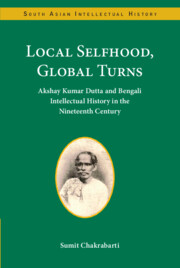 Local Selfhood, Global Turns
Local Selfhood, Global Turns Book contents
- Frontmatter
- Dedication
- Contents
- Acknowledgements
- Note on Transliteration
- Introduction
- 1 The Discontents of Eclecticism: The Milieu of Akshay Kumar Dutta
- 2 The New World of Science: Akshay Kumar Dutta as the ‘Science Worker’
- 3 The Tattwabodhini Period: The Conflicting Contours of Self-Fashioning or Towards a Global History?
- 4 Reconstructing Bengali Selfhood: The Conception of Dharma in Akshay and Bankim
- 5 On the Question of the Public Sphere: Civic Life, Polity, Dissent, and an Affective Engagement with the Janasamaj
- 6 Imagining Bharatvarsha: Identity, History, Nationhood
- Conclusion and Further Thoughts
- Bibliography
- Index
Conclusion and Further Thoughts
Published online by Cambridge University Press: 30 June 2023
- Frontmatter
- Dedication
- Contents
- Acknowledgements
- Note on Transliteration
- Introduction
- 1 The Discontents of Eclecticism: The Milieu of Akshay Kumar Dutta
- 2 The New World of Science: Akshay Kumar Dutta as the ‘Science Worker’
- 3 The Tattwabodhini Period: The Conflicting Contours of Self-Fashioning or Towards a Global History?
- 4 Reconstructing Bengali Selfhood: The Conception of Dharma in Akshay and Bankim
- 5 On the Question of the Public Sphere: Civic Life, Polity, Dissent, and an Affective Engagement with the Janasamaj
- 6 Imagining Bharatvarsha: Identity, History, Nationhood
- Conclusion and Further Thoughts
- Bibliography
- Index
Summary
It is inevitable, perhaps, as one winds up an article, a chapter, or a monograph, to reflect on the intention of the project. What it was that one had begun with, and what has after all been said. Also, the writing of history has this double-edged quality of betrayal. It is the continuous and keen sense of being haunted by what one is forgetting, or setting aside, or deliberately putting away as one ‘remembers’ through the act of writing. As I write the conclusion I also wonder how this book may have taken many directions, and how our ways of seeing are mostly inadequate to the task at hand.
The Science Worker and the Scientist
In what we may call the age of empire in the Indian subcontinent, the most significant methodological and epistemic changes within the polity germinated in the nineteenth century under the abiding and fraught influence of modernity. As a subject of history, therefore, the nineteenth century in India has attracted much attention from historians across the globe. There have been analyses of categories, epistemic shifts, significant cultural and political figures, and events that have shaped the trajectories of thinking about India as a pre-colonial, colonial, or post-colonial space, and these have had a significant influence on how the historian might begin to think of intellectual history of this period in the Indian subcontinent and its global implications, if at all. In his book Horizons: A Global History of Science, James Poskett recounts an event of some significance. It was in January 1897 that Jagadish Chandra Bose, as the first ever Indian scientist, was to deliver a talk on ‘Electro-Magnetic Radiation’ at the Royal Institution in London. Poskett writes:
Well aware of the significance of the occasion, Bose concluded his lecture with an appeal to bridge the gap between European and Indian science. He expressed his sincere hope that ‘at no distant time it shall neither be the West nor East, but both the East and the West, that will work together, each taking her share in extending the boundaries of knowledge, and bringing out the manifold blessings that follow in its train.’ And with that, the audience rose to its feet in applause, eager to follow this enigmatic Indian physicist into the hidden world of electromagnetism.
- Type
- Chapter
- Information
- Local Selfhood, Global TurnsAkshay Kumar Dutta and Bengali Intellectual History in the Nineteenth Century, pp. 223 - 237Publisher: Cambridge University PressPrint publication year: 2024
